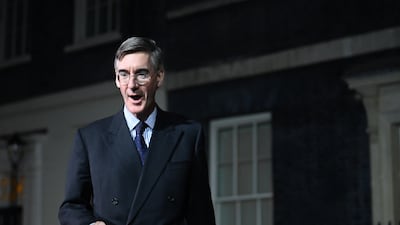Jacob Rees-Mogg has been appointed the minister in charge of tackling Britain’s energy problems in Prime Minister Liz Truss’s first Cabinet, raising eyebrows because of his aristocratic manner and views on climate change.
“We have the most terrific amount of work to do,” Mr Rees-Mogg told his new staff after being appointed Secretary of State for Business, Energy and Industrial Strategy late on Tuesday.
Mr Rees-Mogg, 53, takes on his first major departmental brief after serving under Boris Johnson as a Cabinet Office minister and leader of the House of Commons.
It takes in two of the three areas named by Ms Truss as her top priorities for government ― generating economic growth and finding solutions to the energy crisis set to dominate her first months in office.
“My overriding mission is to deliver affordable and plentiful energy to the British people and to make the economy as efficient, innovative and dynamic as possible,” Mr Rees-Mogg said.
A wealthy traditionalist known for his upper-class accent and nicknamed the “honourable member for the 18th century”, his appointment was met with disdain on the opposition benches.
Both admirers and critics highlighted his record of criticising “climate alarmism” and environmental “doomsayers”, and his enthusiasm for extracting more fossil fuels from Britain’s North Sea reserves.
“This is a deeply unserious appointment at a time when the challenges businesses face could not be greater,” said Labour front-bencher Jonathan Reynolds, the shadow minister for Mr Rees-Mogg’s department.
Shadow climate minister Ed Miliband, a former Labour leader, urged Mr Rees-Mogg to “have no truck with those questioning climate science”, amid pressure from some Tory MPs to ease off on Britain’s 2050 net-zero target.
“And remember: we need energy policy for the 2020s not the 1820s,” Mr Miliband said.
Ms Truss has committed to the 2050 target but promised to maximise North Sea oil and gas production and end the ban on shale gas fracking that was brought in under Mr Johnson.
Mr Rees-Mogg, who was an early backer of Ms Truss’s Conservative leadership campaign, said in July that the country “must exploit domestic energy supplies to bring down prices”.
UK Cabinet appointments - in pictures
His predecessor at the business ministry, Kwasi Kwarteng, was named chancellor of the exchequer on Tuesday and will be central to the government’s cost of living plans along with Mr Rees-Mogg.
The government is expected to announce short-term relief measures as early as this week that could include a freeze on energy bills costing as much as £100 billion ($115bn).
However, both Ms Truss and Mr Rees-Mogg have expressed scepticism about levying a windfall tax on energy companies making record profits during the crisis.
Mr Rees-Mogg’s new role could also him the chance to widen his campaign to get British workers back to the office, after the pandemic led to a boom in remote working.
As a Cabinet Office minister, he pushed civil servants to return to their desks, arguing that “ideas can be developed and small problems solved by a brief conversation in the corridor”.
The pro-Brexit minister is also known for favouring imperial measurements and in 2019 circulated a style guide to civil servants telling them to use the courtesy title “esquire” in correspondence.






































